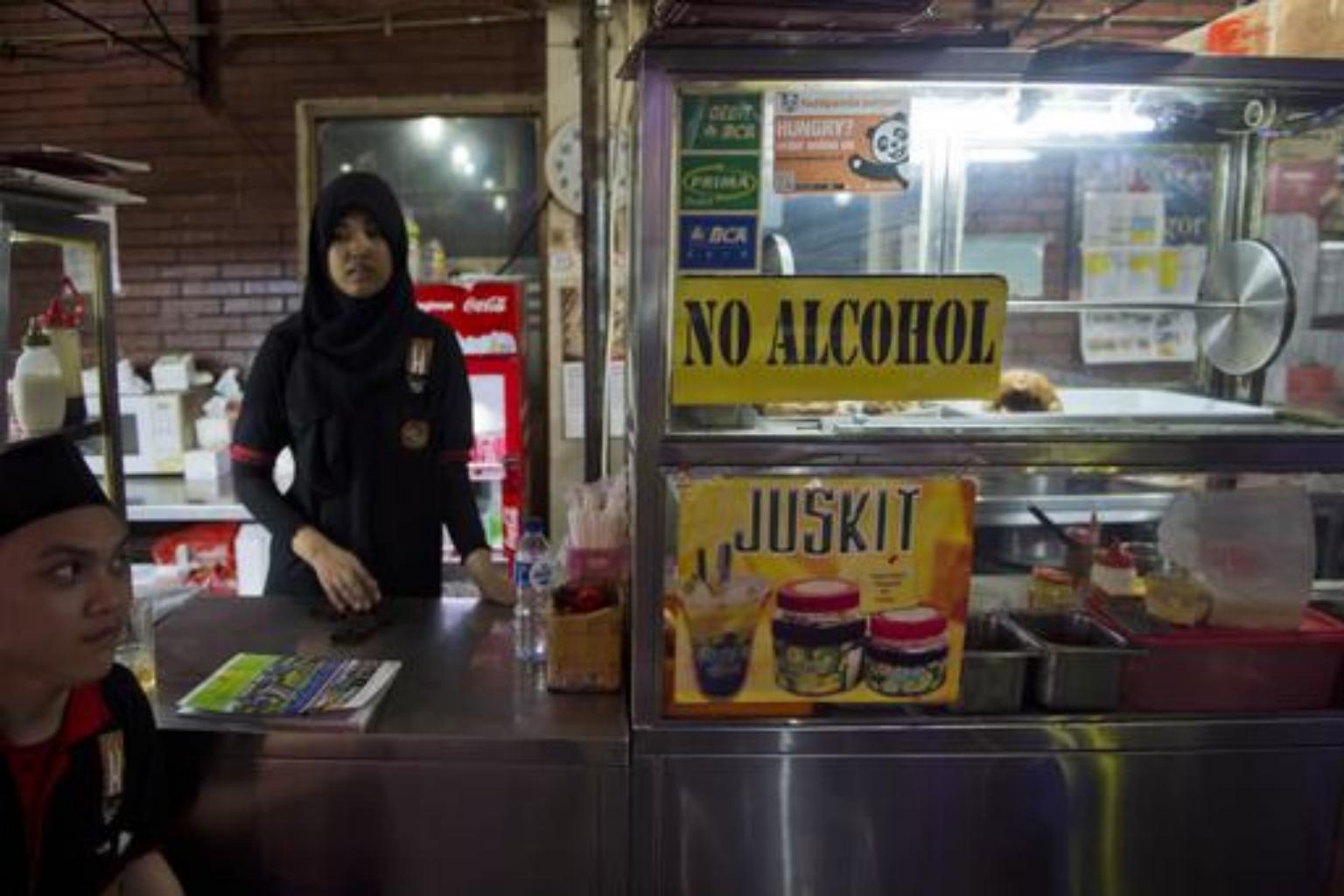Biggest Muslim organisation in Indonesia rejects total alcohol ban
Sign up now: Get insights on Asia's fast-moving developments

A restaurant worker waits for customers as a 'no alcohol sign' is displayed on the food stall in a tourist district in Jakarta.
PHOTO: AFP
JAKARTA (THE JAKARTA POST/ASIA NEWS NETWORK) - Fulled by growing concerns about the danger of bootleg liquor, the Jakarta branch of Nahdlatul Ulama (NU), the largest Muslim organisation in the country, opposed on Tuesday (Aug 15) a total ban on alcohol in the capital.
Mr Abdul Wahid Hasyim, the head of the NU Jakarta research and development institute (Lakpesdam Jakarta), said that banning alcohol sales would result in an increased consumption of bootleg concoctions, which could lead to serious injuries or deaths.
According to a survey by Lakpesdam Jakarta of 327 teenagers across the city in February, 71.5 per cent of the respondents said they could easily get cheap oplosan, the local term for bootleg liquor, at herbal drink stalls.
The bootleg liquor, usually homemade, often causes poisoning as it is sometimes mixed with unsafe ingredients, such as mosquito repellent or paint thinners.
"No one has ever died from drinking beer, but our young people could die if they drink bootleg liquor," Mr Abdul said.
In September 2016, two residents of North Grogol, West Jakarta, died after consuming bootleg liquor made from alcohol and an energy drink.
Two months later, 10 men died in Jatinegara, East Jakarta, after consuming bootleg liquor from a producer in Kampung Rawa Badung, Cakung, East Jakarta.
A proposed alcohol ban has been a source of dispute in Indonesia, a predominantly Muslim country that has been recently gripped by a rise in Islamic conservatism.
In 2015, the Trade Ministry prohibited the sale of beer in minimarts. This has been cited as one of the reasons for the closure this year of 7-Eleven, a convenience store chain, that had earlier enjoyed popularity among young people hanging out over beer.
Initiated by Islamist parties, the United Development Party (PPP) and Prosperous Justice Party (PKS), a controversial bill to prohibit alcohol is under deliberation at the House of Representatives.
The deliberation has been deadlocked as other parties have opposed a total ban, saying that there should only be controls on the distribution, sale and consumption of alcohol.
Support for regulated distribution of alcohol had earlier been voiced by Fatayat, the female wing of the NU, which argued that a total ban would go against the pluralistic nature of Indonesia.
"If a government policy leads to vastly increased distribution of and easier access to bootleg liquor, I think this would be the wrong step by the government," Mr Abdul said.
He said the total ban on alcohol sales in minimarts did not solve any problems, as it only increased the demand for bootleg liquor.
"As a Muslim, of course, alcohol is still haram (forbidden). But this is not about halal or haram, this is about saving our younger generation, this is about making an effective policy," he said.
Mr Ihsan Yunus, a member of House Commission VI overseeing trade, and a member of a special committee on the alcohol bill deliberation, said it was hard to combat the distribution of bootleg alcohol, making it safer to allow a limited distribution of legitimate alcohol.
"There has also been no research done on the correlation between alcohol consumption and crime," said the Indonesian Democratic Party of Struggle (PDI-P) lawmaker.
The Centre for Indonesian Policy Studies (CIPS) found that since 2010, there has been a significant increase in the consumption of illegal alcohol across Indonesia after several regions issued bans on alcohol sales.
According to a CIPS survey in several cities across Sumatra and Java, 38.7 per cent of respondents said they bought bootleg liquor because it was cheaper, while 20 per cent said it was because it was more accessible.
The CIPS said most bootleg liquor sellers sold liquor that contained dangerous ingredients such as methanol, and chemical ingredients such as insecticide.
According to media monitoring by the CIPS across Indonesia from 2013 to 2016, 487 people died as a result of illegal alcohol consumption; from 2008 to 2012 there were 149 such fatalities.
Mr Maksum Machfoedz, the deputy chairman of the NU, told The Jakarta Post that a ban on alcohol was still important, but it was not enough to curb alcohol consumption.
He said a ban would be pointless without character building so that young people would understand the dangers of alcohol.
"This is a supply-and-demand mechanism, if there is strong demand, then suppliers will reach out to them. So we have to build people's characters to make them realise that it's not good to consume alcohol," he said.


